We almost lost our boat last Sunday. Because of one careless moment. One bit of just not thinking.
Before I go any further, rest assured that we’re physically okay (a bit mentally shaken) and Barefoot Gal has only minor damage.
What Happened
To make a long story somewhat shorter, it happened this way. As part of preparing to go to the Bahamas, Dave changed the Racor fuel filters, then ran the engine to make sure all the air was out of the fuel lines. Just as he was ready to shut the engine down, it died and wouldn’t restart. Testing showed that the fuel pump had died. We have a spare, so Dave dug it out and began to install it. It’s in a bit of an awkward spot and in the process of installing the pump he apparently moved it just wrong (touching a positive and negative wire at the same time) so that it caused a short in the engine wiring, which led to a fire
Do you see where we went wrong?
We didn’t shut off power to the engine before working on it. When working on anything electrical — or in the vicinity of something electrical — the rule is to always shut off the power so that you can’t accidentally put a wrench or screwdriver in such a way as to create a short. Dave was so intent on the fuel pump problem that he forgot, and I was sitting right there working on something else and it didn’t occur to me that he hadn’t.
Dave says it was his fire; I say I’m equally responsible since I was right there.
Wrong & Right
What we did wrong is painfully obvious. We seriously f’ed up. I normally keep my language clean on TBG, but this screw up is pretty major.
But we did do a few things right:
- Dave yelled “Fire” immediately and I grabbed the nearest fire extinguisher — just one step away from me — and handed it to him. I knew how to release it from its bracket and Dave knew how to use it (for the record, I know how to use it too).
- I grabbed the two fire blankets and remaining fire extinguishers and put them beside Dave, then turned off the batteries.
- The fire appeared to be out after just the first fire extinguisher, but Dave threw one of the fire blankets over the area just to be sure.
- Neither one of us panicked. We knew what to do immediately and did it.
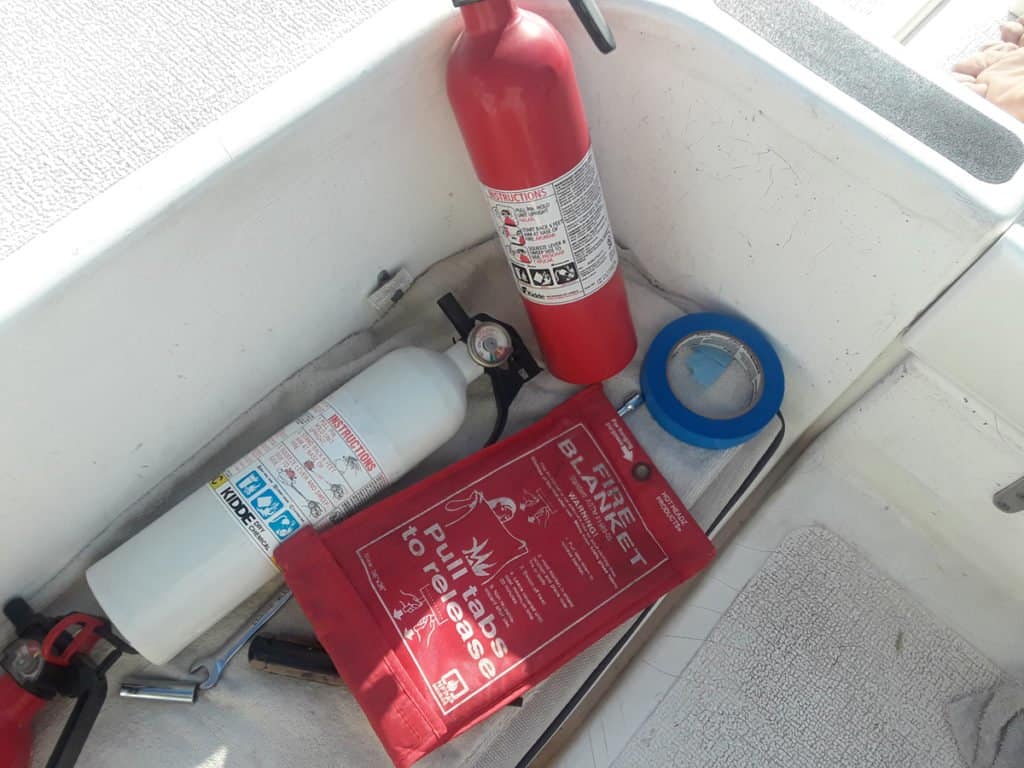
More Lessons
Looking at the damage more closely Monday morning, we were surprised to see how extensive the damage was. Wires 18 inches from where the flames had been were damaged. There were numerous different sections of wire that were burned through or had insulation melted off.
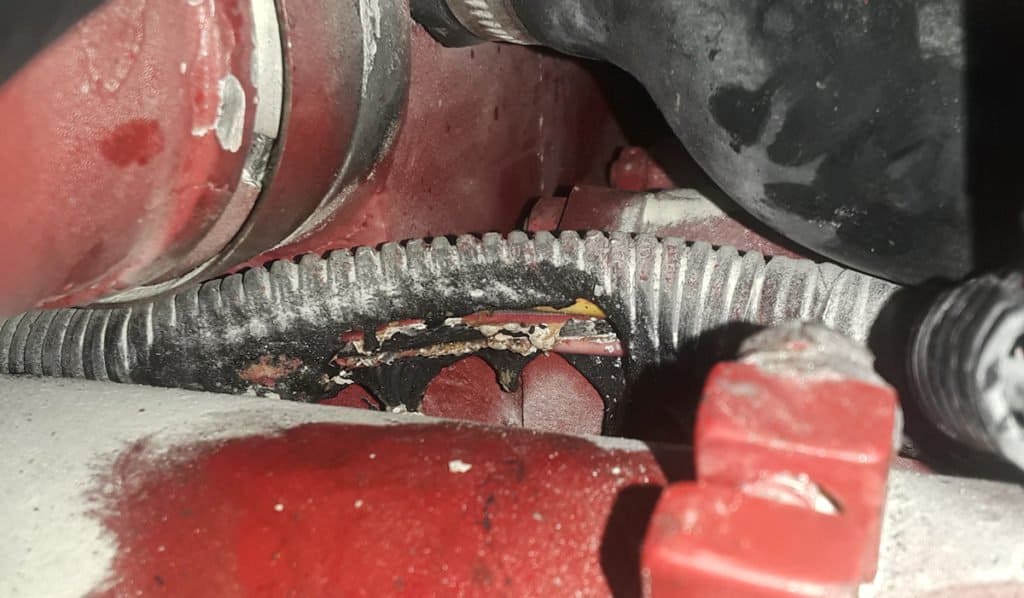
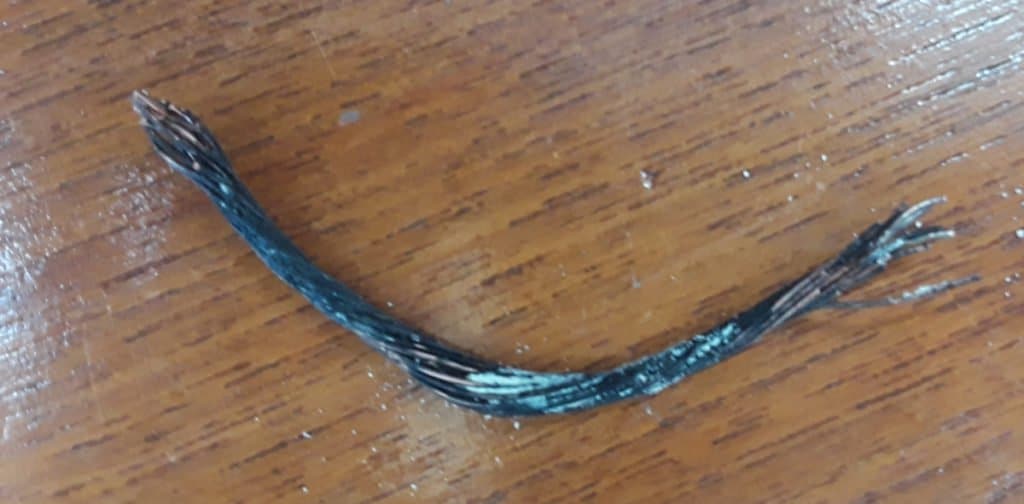
When we removed one side panel from the engine compartment, we discovered that the insulation on it had burned almost all the way through. This was absolutely chilling as the propane locker was just on the other side of that panel. Had the fiberglass underneath the insulation ignited, the propane tanks almost certainly would have exploded. The jerry cans of gasoline 8 feet away would have gone next . . . plus the diesel fuel in the main tanks and the jerries. Not only would Barefoot Gal not have survived, I doubt we would have.
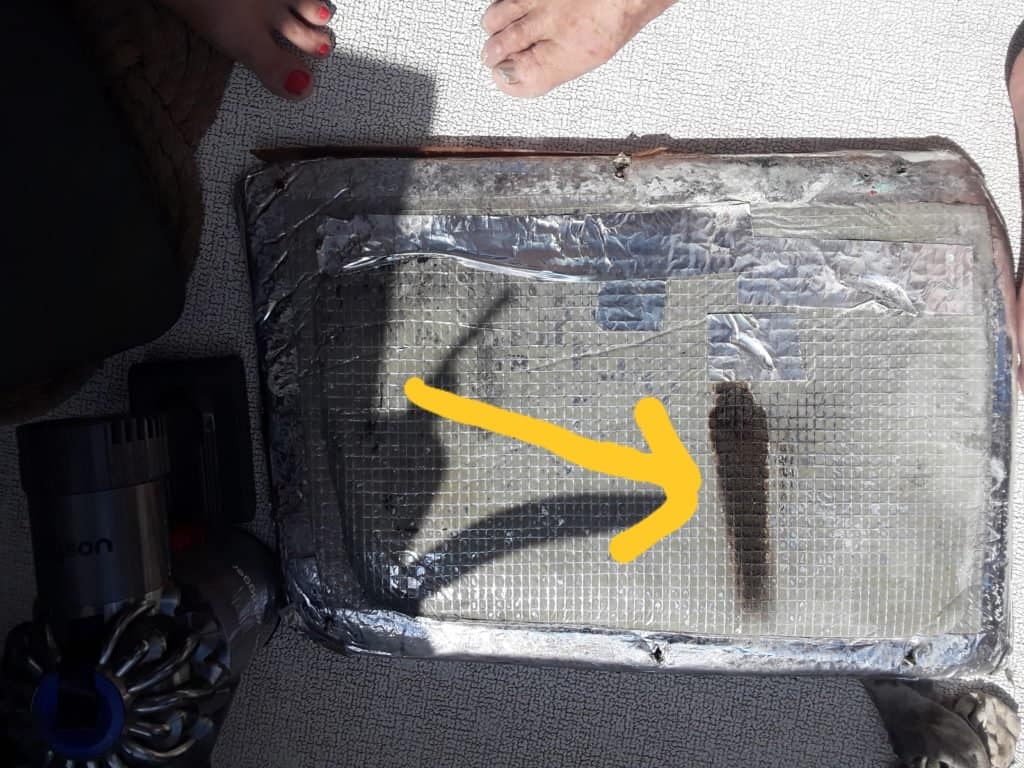
And finally, we learned what a mess a fire extinguisher makes. The chemicals go everywhere, in every nook and cranny, which was exactly what we needed when we had a fire. So I’m thankful for the mess, but it was atrocious to clean up.
Looking Forward
We still plan to go to the Bahamas, but it’s likely to be delayed at least a few weeks from our hoped-for May 1 “ready date.” The engine needs to be completely re-wired and it’s going to take a week to ten days just to get the new wiring harness, then install it. And until it’s installed, we won’t know if other components in the electrical system were shorted out or otherwise damaged. So there may be more work to do before we can leave.
So far, everything is cleaned. We removed the alternator and had it tested; it’s fine (Gemini alternators are expensive, so that’s a bit of good news). And I managed to clean all the fire extinguisher crud out of it. At least I hope I got it all.
Bottom Line
The bottom line is that we’re still shaken. We think we’re pretty safe cruisers. And then something like this happens and you see how quickly a situation can go from a minor problem (dead fuel pump) to disaster (boat fire, nearly an explosion).
The obvious takeaway is to always cut power to what you are working on and near. But the bigger lesson is simply to take a minute when starting a project and think about the safety aspects. Think if you’ve taken any precautions you should. Even if they’re inconvenient. And if the nature of a project changes (change the Racors to change the fuel pump), think again about the safety issues.
On an even higher level, think about a fire on board your boat. Have you thought what you’d do? Does everyone know where the fire extinguishers are? How to operate them? Do you have any fire blankets? Smoke detectors? Have you ever done a fire drill?

Carolyn Shearlock has lived aboard full-time for 17 years, splitting her time between a Tayana 37 monohull and a Gemini 105 catamaran. She’s cruised over 14,000 miles, from Pacific Mexico and Central America to Florida and the Bahamas, gaining firsthand experience with the joys and challenges of life on the water.
Through The Boat Galley, Carolyn has helped thousands of people explore, prepare for, and enjoy life afloat. She shares her expertise as an instructor at Cruisers University, in leading boating publications, and through her bestselling book, The Boat Galley Cookbook. She is passionate about helping others embark on their liveaboard journey—making life on the water simpler, safer, and more enjoyable.
Your VHF can do so much! Learn how to use ALL its features for just $39:
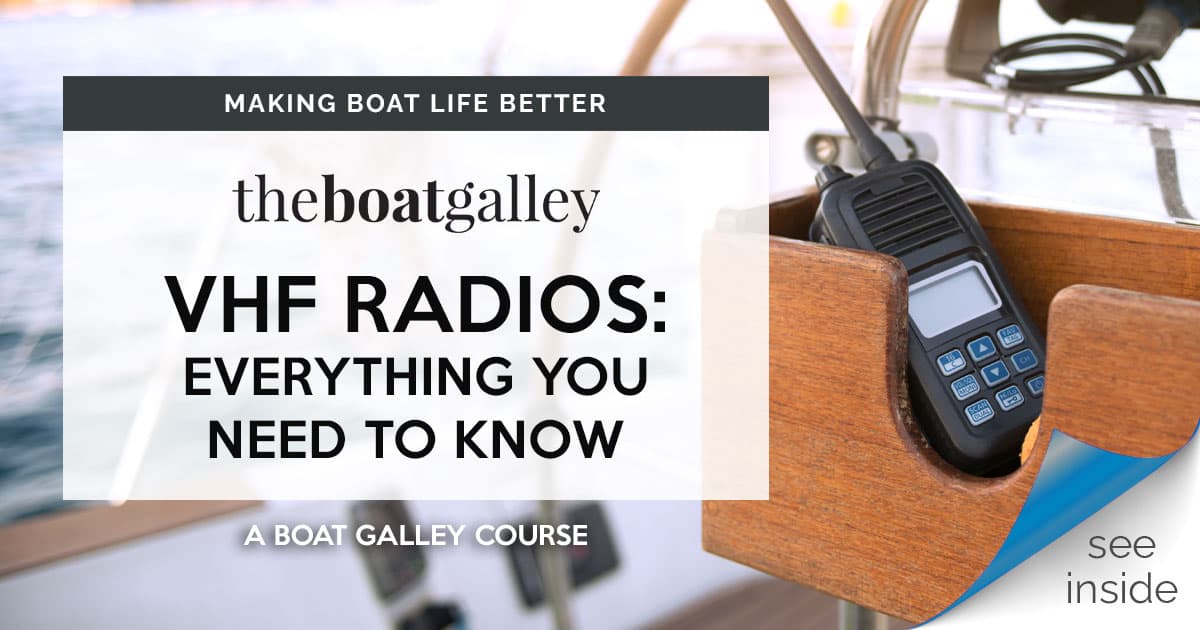







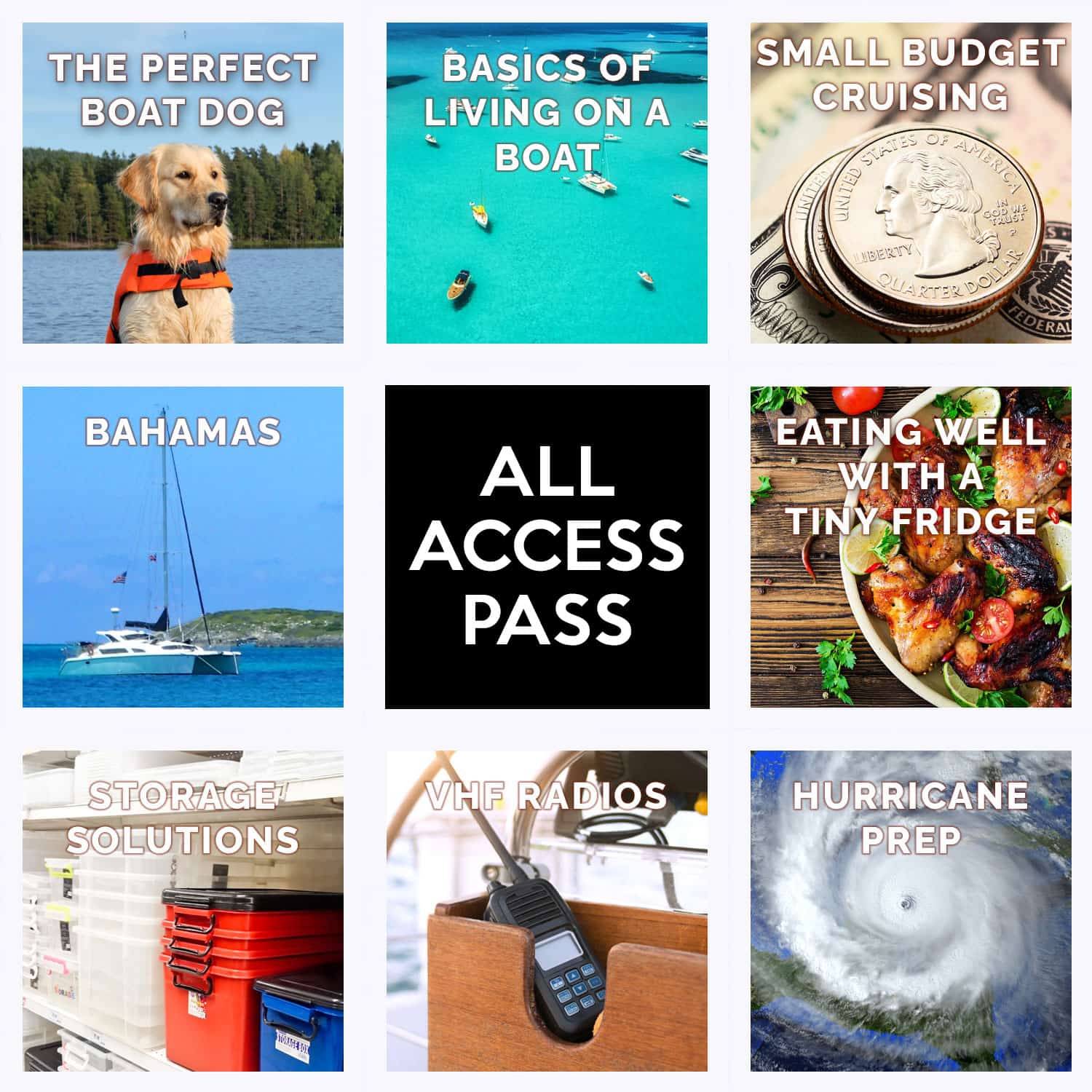
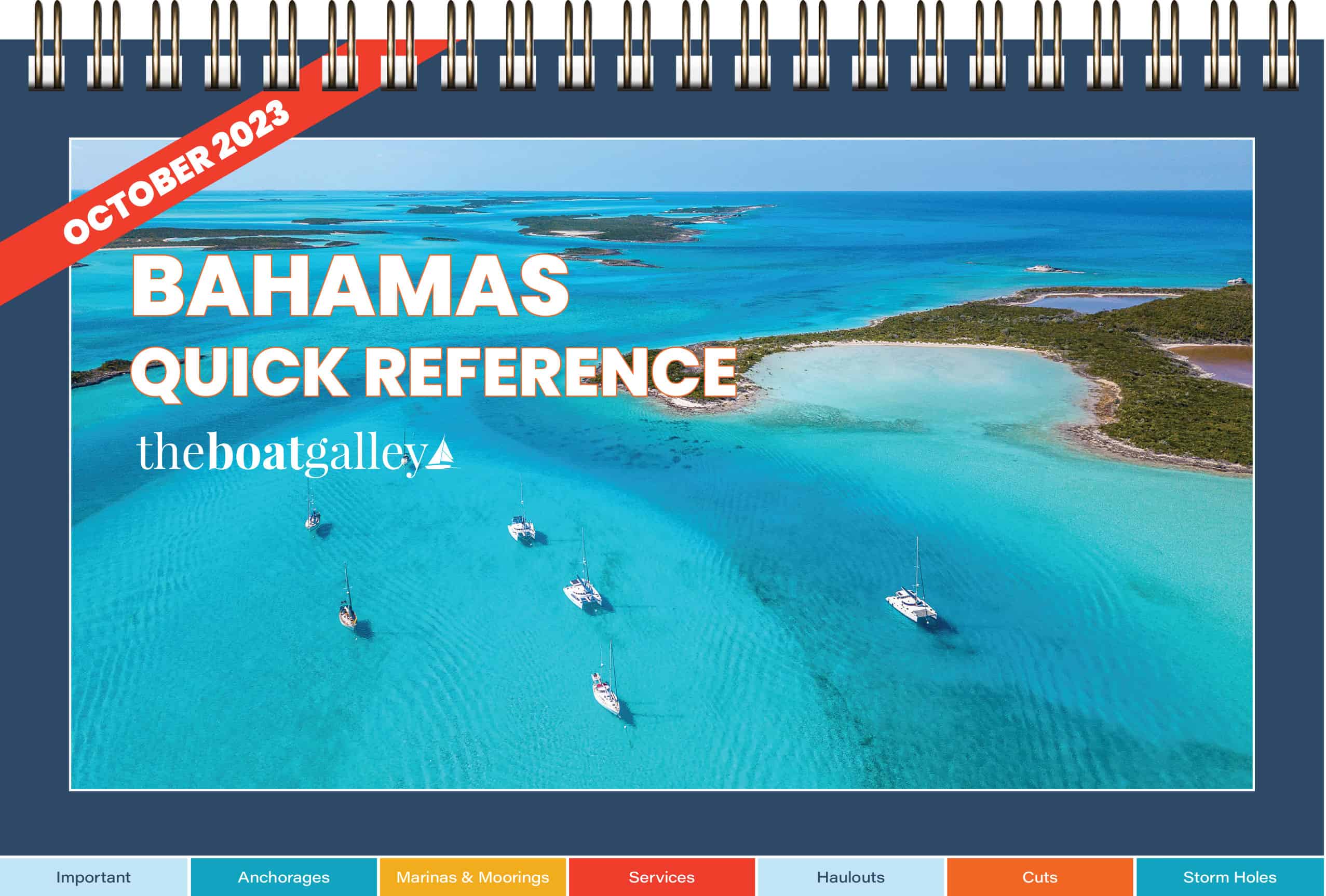

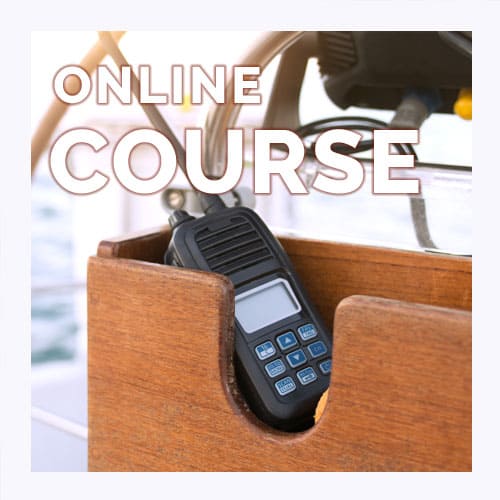
Scott Sanders says
Glad to hear you guys are safe!
Great post.
Thanks for sharing.
It’s not all blue skies and smooth sailing.
Cheryl says
Keeping calm, having what you needed close at hand may be what saved your lives. We also had an electrical fire and I know how panicked it can be. . Lesson for all of us. Glad you safe.
Deby says
Sound advice!
I’ll be sharing the link to this article far and wide!
Deby
2SunsetSailors
Mark says
I didn’t think diesel burned bless atomized. What actually burned?
Carolyn Shearlock says
Insulation on wiring.
Capt. Wayne Canning says
A couple of thoughts, Although disconnecting power is a good idea when working on things the terminals should never have been exposed to shorting in the first place. ABYC standards call for all positive terminals to be covered to prevent this type of issue.. Next the fire extinguishers you show in the photos are subject to a factory recall, you are lucky they worked. Point is maintain and update your fire extinguishers.. If you did not do so the first thing that should be done in an electrical fire is to disconnect the power supply, not sure if you did this. If not done a fire can easily restart. Glad to see you had fire blankets I always recommend those.. Finally glad things did not get worse and you were able to control things before they got out of hand..
Carolyn Shearlock says
Our fire extinguishers were not amongst those in the recall. We had called when the recall came out and gave our serial numbers — these were NOT included. I handed Dave the fire extinguisher and then turned the power off, then got the other fire extinguishers and fire blankets.
Maree says
Carolyn, I just want to say a huge THANK YOU for sharing. I have no doubt it was a hard post to write for many, many reasons least of which is that it isn’t easy to talk about something so nearly catastrophic that we feel responsible for. Please forgive yourselves – we are all human and none of us immune to mistakes. For myself, the fact that you and Dave have shared this so honestly proves so much more about how right you are for the boat and your capabilities than if you were in fact perfect and it had never happened. It also makes me realise my own weakness, I have a story to share that I have been putting off due to what others may think of us over making a simple error leaving a seacock open and nearly sinking the boat. (I use “us” as I feel the same as you, we are in this together despite who indeed left the valve open). After reading your story I pledge to myself to share and publish it. Wishing BoatGal a speedy recovery back to perfect shape and also hope yourself and Dave can feel better soon (I know how tough self forgiveness is and how many sleepless “what if” nights are ahead)
Regards
Maree
Carolyn Shearlock says
Thank you for that, and glad that you survived your mistake as well.
martin says
I agree with Maree’s reply totally.. Your posting of good information like this, even if very personal and embarrassing at times, helps us all (even ex boaters with cars and houses, etc), and can start a thread, like this did of a good helpful discussions….
** Hug Dave for me, even give him a big kiss on left cheek for me, I sure he will make comments about my request. I can hear it now.. love it.
martin
“the old cats meow”
Carolyn Shearlock says
Thanks, Martin! Love to both of you and glad you’re doing so well. Dave loved getting to talk to you!
Amy Kelley says
I’m sorry this happened to you and so relieved to know you are ok. Thank you for sharing. Honestly we never even thought about turning off the electrical supply to our engine. We have a battery kill switch —which I knew about should there be a fire —never thought about it in terms of fire prevention. We will now cut off electrical supply to the engine even if just sticking a big screwdriver down there to adjust the alternator belt. We have fire extinguishers and a fire blanket and will make sure everyone on board including the kids have a refresher on how to use them. Carolyn, your honesty and vulnerability and wisdom might have saved many other lives. Thank you. The Kelley Family s/v Wonderstruck
Brian says
Glad you are both OK. You are right fires are very unpredictable, and the the extinguishers cause more cleanup than people imagine.
Hope you get it all up and running and back on schedule. The most important thing is no one got hurt, everything else can be repaired.
Jessica Heinicke i says
Thank you for sharing such a difficult story. Before we departed to cruise, I asked for a halotron fire extinguisher for my birthday. I had read an article detailing how the dry chemical extinguishers can make it impossible to breathe down below. As a result a couple lost their boat because the fire reignited and they couldn’t stay below to continue fighting it. I also asked for the biggest fire extinguisher I can lift. The little ones the Coast Guard requires only put out 10-20 seconds worth of extinguishing agent. I also keep a fire blanket right near the galley on your recommendation. It has become a conversation piece due to its prominent location! I hope we never get to use these little gems. I’m glad yours worked when you needed them most. Do you have the information on which extinguishers were recalled? We should look into ours. Thank you again and always!
Carolyn Shearlock says
Here is the info on the Kidde recall. Ours were in the “affected” group, and they then have you call with the serial number(s) to determine if yours is one with a problem or not. If it is, they send you a new one.
https://www.kidde.com/home-safety/en/us/support/product-alerts/recall-kidde-fire-extinguisher/
Gwen Coleman says
Thank you Carolyn, this helps us all to be more mindful. We have our moments too
David V says
Glad you guys are okay, and thanks for sharing your hard-earned wisdom on the issue. It takes a lot of guts, and even more genuine humility, to go public when something like that happens. The mark of a true professional, and a model for the rest of us.
John says
So glad you are safe. Sorry about the mess and expense. Some lessons are harder than others and I hope I never have to learn this one.
Julia Blackburn says
Carolyn,
Thank you for sharing such a scary situation with all of us so that we may learn. Because of the initial post from Capt Canning and your reply about calling Kidde, I did just that to discover that our fire extinguishers were part of the recall. I have learned so much from you over the years, have adopted many of your practices and now feel that you have brought us a safer environment. I admire your knowledge and resilience! And I am truly grateful!
Safe travels!
Fair winds and following seas!
Linda Stryker says
My neighbor live aboard had a fire on the first cold day of winter. He lit his buddy heater without noting the gas hose had cracked. He said it took 6 weeks to clean up, but we all learned from him, but darn that was close.
Lisa Thorburn says
Thank Goodness you are both okay! The boat can be fixed, but us humans sometimes take a bit more effort to repair 🙂 And thank you for sharing! It is sometimes so hard to put ourselves out there knowing others can (and will) shoot us down for just being human. Wish I was going to the boat show – would give both you and Dave big hugs!!!!
Jeff Peters says
Carolyn. Thank God you guys are OK. AND thank you for sharing the event and the outcome. Cudo’s to you for being prepared and reacting quickly to what could have been catastrophic. Cool heads prevailed. And lastly, thank you for discussing the nessesity of thinking about the safety “things” that we all should do prior to starting any project. Everything we do carries some risk and change is the mother of risk. A great plan goes ti hell when something changes and one does stop to rethink the plan. Best Jeff
Dave says
Good job. It’s easy to make a mistake but you handled it in a expeditious and proper manner. The real test is how you act under fire and you guys are the real deal.
Sandy McCoy says
Thank you so much for this story. I am ordering fire blankets immediately.
One question – did you use anything special for the clean up?
Hope you get to the Bahamas soon.
Carolyn Shearlock says
Vacuum–our ShopVac worked better than the Dyson as I could get the hose in more places. A set of small brushes (like you’d use to clean a computer) for the ShopVac. A bunch of brushes in different sizes. And a tiny screwdriver to scrape the crud out from around bolts. Mantus headlamp to see.
Donna on Calypso Voyager says
WOW – so glad you both are OK. Thank you for sharing this and all your other wonderful tips. Maybe we will see you in the Bahamas.
Paula says
So glad this didn’t turn out worse!! I am surprised to learn that your propane locker is that close to the engine room!….have you ever thought of relocating it ? Ours was like that when we bought the boat and our surveyor said, move it immediately, ….the actual locker was all the way at the aft of the boat….away from the galley and engine…but I know a catamaran setup is really different.
Hope you get all fixed up and on your way soon!!!!
Wil says
So glad you both are Ok, thanks much for sharing with us. Dry powder extinguishers can be quite corrosive.One trick I learned from restoring vintage cars (some with engine fires-old VWs come to mind) is after dry cleanup to spray a mist of WD40 over the entire area where the powder was used.
Also, though knee-bucklingly expensive, (https://www.amazon.com/s?k=halotron&s=price-asc-rank&crid=25TKHKZBYWFQW&qid=1556114397&sprefix=halotron%2Caps%2C236&ref=sr_st_price-asc-rank), Halotron fire extinguishers leave no cleanup/corrosion issues. I swapped out all my dry powder extinguishers years ago–took a while to afford them though.
Been a fan of your website for many years, this is yet another good example why.
Marga says
Thanks for sharing, it’s so valuable to see how quickly and easily things can happen to any of us!! I had a question about your takeaways / lessons learned. I’m not sure if I completely understand how the fire started. However, if it was from the leads shorting, were there appropriate fuses in the positive supply that blew when the short occurred? The idea being that the fuse would blow before the current on the wire could reach a level that would cause a fire. Is this something that already existed but didn’t perform as expected, or were there other complications? Again thanks for sharing, it helps us all learn and remember how quickly things can go dangerous. You’ve inspired me to get a fire blanket on board!
Brian mcmahon says
Marga makes a very thought-provoking point. Was the circuit that shorted equipped with a fuse and did the fuse malfunction? Come to think of it, our fuel pump has no breaker on the distribution panel. So, unless there is an inline fuse somewhere, we are unprotected! Thank you, thank you for the great discussion!
Carolyn Shearlock says
No fuse. One of those places that no fuse is required by ABYC and the boat manufacturer didn’t put one. We’ve now fused the entire engine wiring harness.
Bruce S says
Thanks for the post Carolyn. Fire IS the biggest threat to boat and life and we should never forget that. Sharing experiences like yours is invaluable. Thank you so much ☺️
Dave Skolnick (S/V Auspicious) says
Dear Carolyn,
I’m sorry to read of your trial. As I read your article lots of bits of advice went through my mind but for every one I realized “Carolyn knows that already.” *grin* Dave and you are smart cookies.
If there is anything I can offer beyond good thoughts just let me know.
Charlotte Jones says
I’m so grateful that you, Dave and your Barefoot Gal are all safe and relatively unharmed! Thank you so much for sharing this experience as well as all your boating experiences with us. We are preparing to head to the keys for a couple months aboard our 36′ Luhrs so I am reading some back issues of The Boat Galley to get in the right mind set…making my lists and checking them twice!. You are a treasure and your posts are so interesting and always on point. Praying for Barefoot Gal’s quick and complete recovery. I look forward to reading/hearing all about your Bahamas adventures. We’ve been to Bimini a few times about 10 years ago…but I’d love to head over sometime this summer. Safe Travels!
Max says
Ironically, a few days after we discussed your blog post we had a similar incident here. No fire in our case so we were lucky but a good reminder to stay vigilant. Thanks for the blog.
Carolyn Shearlock says
Whoa. I am so glad to hear it didn’t turn into a fire, but still scary.
David VanDenburgh says
Last year I bought a bunch of boat gear from a guy who lost his boat to an engine room fire. It was night, they were sleeping, something shorted, a fire started. They awoke and discharged all their extinguishers into the engine room but it wasn’t enough. The fire quickly melted fuel lines and hundreds of gallons of diesel poured out of the tanks into the engine room. They barely escaped with their lives – and nothing else. What he had left was in storage.
We immediately installed fuses on our batteries.
Chuck B says
Putting fuses on the battery is a great start, but it’s not enough. It doesn’t take much current to start a fire — just more than a wire is rated for. Or possibly even less if the wire is damaged, corroded, or connected in a way that raises its resistance. If you have a 20 A fuse on your battery and 19 A is running through a small gauge wire, you could have trouble — and the battery fuse may not be sufficient to help. It’s the exact purpose of fuses to protect wires from overheating and possible fire by preventing too much current from flowing through them. As boats tend to have wires of different sizes, it follows that you’ll need fuses of different sizes appropriate for those wires. Fire is one of the most precarious situations possible on a boat — especially when offshore — so this stuff is important to get right.
Best,
Chuck
Phil_fr says
Hello,
Very happy that there is only minor damage thanks to an ultra fast reaction. Now, you have to repair and control the circuit (s) … 🙁
Caution when cleaning, the powder used in these fire extinguishers is extremely corrosive to any metal and electrical parts. Clean well and sometimes with water (then rinse off) to avoid creeping and invisible corrosion (over time).
I proscribed universal powder extinguishers whenever possible and uses CO2 extinguishers.
Sorry for my average english.
Phil from France
Graham Richardson says
So Glad neither of you were injured.
Thanks for sharing. A very timely reminder for all.
We need to refresh procedures before evens like this happen, for sailing in general as well.
Geroge says
Thanks for sharing, great article and good reminder of how a small oversight can lead to a big problem.
A word of comfort on propane cylinders though – it is extremely unlikely that the cylinders would explode, even if fully engulfed by a fire.
When in a fire they will produce a large jet of flame once the pressure relief valve activates, but they wont go boom, and there will be a significant delay (minutes) before they heat up enough to do anything.
Important to remember of course that propane *can* go boom, just not while it’s in a gas cylinder with a relief valve.